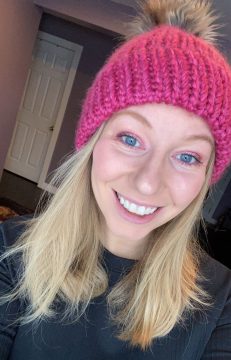Tianna Page is a graduate of the West Kootenay Rural Teacher Education Program (WKTEP). Prior to enrolling in WKTEP Elementary, Tianna was living in the West Kootenays, working as a child and youth care worker in an alternative high school.
I already had a degree in psychology and English and was contemplating going into counselling or teaching. After spending time with students in schools, I realized I wanted to go into teaching.

Q1. How did you hear about WKTEP?
I first heard about WKTEP through the principal at the school I was working at. At the time, she was teaching a math course for WKTEP. When she realized I had a degree, and we talked about my long-term goals, she suggested WKTEP. At the time, I actually told her I planned on working for a few years and then pursuing a masters in counselling instead.
Q2. What inspired you to go into teaching?
When I was working at an alternative high school, I realized what an amazing impact educators could have on a student. It’s so important for students to feel safe, cared for, and seen. I realized that I had the ability to be a positive force in a child’s life, and by going into teaching, I could design learning experiences that are diverse and inclusive for all.
Q3. Did you have a favourite educational topic or class that you especially loved, or one that made an impression on you?
I loved the social justice classes. I found them interesting and engaging. In retrospect, it was probably the CORE courses that had the biggest impact on me. In my interviews and post-graduate courses, I am constantly told that I have an incredibly strong teaching pedagogy. All the work during the CORE courses helped me understand exactly what type of teacher I want to be. This pedagogy is the framework and foundation of my classroom. I use this knowledge every single day to guide the way I interact with the world. At the time, I wouldn’t have said that CORE was my favourite. Looking back now, I realize CORE made the biggest impression on me, and has influenced my professional life the most.
Q4. Have you encountered any challenges or learning curves, and if so how did you overcome them?
Nothing could have prepared me for report cards. I did them during practicum, and yet, it was still a harrowing task. Trying to figure out how to organize the learning standards, navigate myedbc, report in authentic ways, all while teaching a split class was challenging. I overcame this learning curve by asking experienced teachers for guidance. I asked tons of questions. I collaborated with colleagues. I couldn’t have done it without them!
When you are using inquiry in your own classroom, it is vastly different. It helps to understand what inquiry looks like from the student’s perspective. Inquiry learning (or project-based learning) is an incredible way to create meaningful learning experiences that provide access points for all students. In diverse classrooms, creating projects that keep students engaged and learning is so important.
Q5. What was your biggest takeaway from practicum?
My biggest take away from practicum is to remember that your inquiry project is meant to help show you how the process works. At the time, it might feel like just another thing you need to do, or just another step you need to take. It can feel stressful during an already stressful time. When you are using inquiry in your own classroom, it is vastly different. It helps to understand what inquiry looks like from the student’s perspective. Inquiry learning (or project-based learning) is an incredible way to create meaningful learning experiences that provide access points for all students. In diverse classrooms, creating projects that keep students engaged and learning is so important. You can use inquiry for any age group. I use it in my K/1 classroom and it is wildly successful. Start by understanding that your inquiry in your practicum is meant to help you understand the process you’re going to use with your students one day.
Q6. What is the one piece of advice you would like to give to a potential WKTEP student?
One piece of advice I would offer is to stay flexible and open-minded. Take risks in your practicum. Make mistakes, fail, and then try again. When you have your own classroom, do the same thing. This profession is all about being a life-long learner. Keep pushing yourself to try new things and to find ways to continue learning. Don’t be afraid to collaborate with colleagues and learn from each other. This profession is filled with wonderful, amazing people who are often just as eager to learn from you.